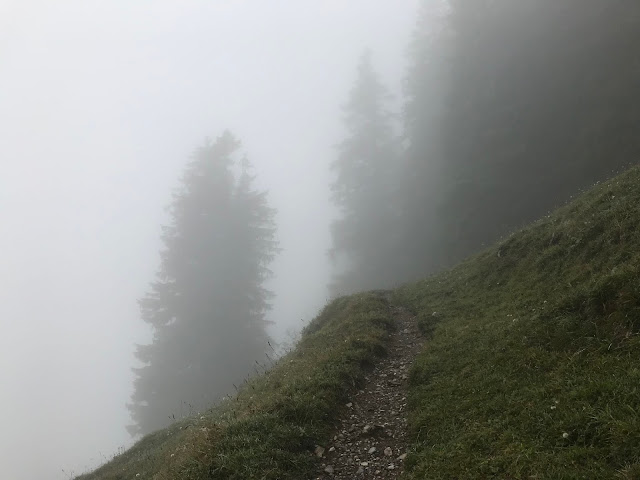Hiking was one of those activities. It was something I just didn't, couldn't, do. The first time I hiked a mountain, I was in my early 20s--twelve years ago. I was in love with a boy, and so I said yes. We were set to leave while it was still dark outside, to make it to the top by sunrise. The days leading up to the hike I was so full of dread and anxiety. I barely slept the night before, tossed and turned all night with nightmares about what the experience would be and especially about how I wouldn't be able to do it. We made it up, and I vowed never to hike again.
Years later, there was another boy. It started with boardwalks around little lakes where he'd say, "Let's go slow and talk about not serious things." Then gentle hikes to waterfalls where we'd eat snacks and tell stories along the way. Then a ridiculous hike one January up the face of an ice-covered mountain. We went so slowly, felt water trickle through mazes of moss, stopped to look at striation patterns in the rock wall, took pictures. The trail was quiet. We were too.
These hikes of his taught me to love hiking. They taught me I didn't have to be afraid. He showed me how to make the mountains my own, how to have the experience in a way that I could love. In all of those walks, hiking mountains became joyful to me. Soon after, I packed that empowerment in my checked luggage and took a plane to Switzerland, where twice a week, before dawn, I'd wake up and wander the Alps all day with myself. A friend came to visit, the healthy, athletic, tough outdoorsy type, and I hiked him so far we couldn't walk anymore.
Since then there have been tiny hikes, day hikes, midnight hikes, and weekend hikes. I've bought the right sort of trail shoes, the right sort of jacket, and prepped a go-bag ready with snacks and a headlamp and sunscreen, because now I go out to the mountains enough that I need those kinds of things.
These hikes of his taught me to love hiking. They taught me I didn't have to be afraid. He showed me how to make the mountains my own, how to have the experience in a way that I could love. In all of those walks, hiking mountains became joyful to me. Soon after, I packed that empowerment in my checked luggage and took a plane to Switzerland, where twice a week, before dawn, I'd wake up and wander the Alps all day with myself. A friend came to visit, the healthy, athletic, tough outdoorsy type, and I hiked him so far we couldn't walk anymore.
Since then there have been tiny hikes, day hikes, midnight hikes, and weekend hikes. I've bought the right sort of trail shoes, the right sort of jacket, and prepped a go-bag ready with snacks and a headlamp and sunscreen, because now I go out to the mountains enough that I need those kinds of things.
This morning, at 1:30am, I rolled out of bed to hike Mount Timpanogos. An eight hour, fourteen mile hike to the summit of the second highest peak in our mountain range. As I was loading my backpack, singing some early morning song to myself, I remembered that morning, twelve years ago, when I was up similarly early, trembling with fear about hiking. To look at that morning, then to look at myself in the bathroom mirror, singing to myself and happily packing a day bag... It was one of the happiest moments of the year for me, to recognize that kind of growth and change in myself. Something that before was impossible, through practice and being gentle with my learning process, has become a true part of who I am. This morning, I was going not for anyone else, but for myself--because I have practiced hiking, have grown familiar with it, have come to love it. It has become a friend and a home to me, a place I go to feel strong and to feel heard. We are familiar with each other, and I go there for refuge.*
This is what I think it means when he says he can make weak things strong to us. This is what I think it means to spin straw into gold and turn stumbling blocks into stepping stones.
This power is in everyone--power to examine your fears, to practice them, to turn them into sources of joy instead of places of pain.
People sometimes think, "Well you just are what you are."
But I have learned to climb mountains.
This is what I think it means when he says he can make weak things strong to us. This is what I think it means to spin straw into gold and turn stumbling blocks into stepping stones.
This power is in everyone--power to examine your fears, to practice them, to turn them into sources of joy instead of places of pain.
People sometimes think, "Well you just are what you are."
But I have learned to climb mountains.
*I really want to underline that I by no means am any sort of a hard-core hiker. I don't trail run, I don't "bag a peak" every Saturday, and steep climbs are still very much a struggle. I really go slowly. I take pictures, I smell flowers. I only made it to the saddle of Mount Timp and not to the hut on the summit, because I got so freaked out with the heights I could barely stand up without getting dizzy! (I suppose that's the next peak for me to summit, my fear of heights!) But I have learned how to have confidence in that space, and that to me is a celebration.






















